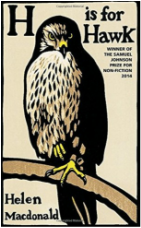
When her father suddenly dies, Helen Macdonald does what many people in mourning do—she escapes life. Specifically, she buries herself into the world of falconry—a sport she discovered when young, whilst reading books. Training a wild goshawk vs. reading about it, however, are two different things...
H is for Hawk is a soaring, triumphant memoir. To me, it's also a poignant reminder that getting lost in the woods and/or with words can sometimes lead to new discoveries (new discoveries such as these—see below).
H is for Hawk is a soaring, triumphant memoir. To me, it's also a poignant reminder that getting lost in the woods and/or with words can sometimes lead to new discoveries (new discoveries such as these—see below).
This book is filled with a warren of words. Here are just a few wild terms that I have dug up for you:
- They carried hawks on their fists: orange-eyed goshawks as remote and composed as statuary, with barred grey tails and breast feathers of vermiculated snow.
- And I drove and drove, and the roads slipped by and the sky annealed into slews of the hardest white and blue.
- There is something of the grandmother about it: antimacassars and afternoon teas.
- Through the gloom and the flocked leaves I can see her yellow nose, and something of her accipitrine crouch.
- For something was stirring in Mabel's accipitrine heart, and perhaps it was spring.
- I feel like White: a tyro, a fool, a beginner.
- It was a bronze falcon standing on a vertical plinth, heavy, stylized, and slightly worn around its wings.
- There is no need, right now, to feel close to a fetch of dark northern woods, a creature with baleful eyes and death in her foot.
- When the hare leapt up from our feet today it was as if it had been made by the field ex nihilo.
- After an hour of walking past temples with fluted columns and painted doors, cupolas, obelisks, porticoes and follies, I started to freak out. Nothing made any sense. Greek Temples, Roman Temples, Saxon gods on runic plinths starred with orange lichen.
 RSS Feed
RSS Feed
